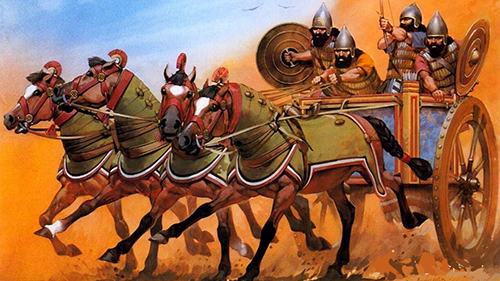 18 And therefore the Lord [earnestly] waits [expecting, looking, and longing] to be gracious to you; and therefore He lifts Himself up, that He may have mercy on you and show loving-kindness to you. For the Lord is a God of justice. Blessed (happy, fortunate, to be envied) are all those who [earnestly] wait for Him, who expect and look and long for Him [for His victory, His favor, His love, His peace, His joy, and His matchless, unbroken companionship]! (Isaiah 30:18, AMPC)
18 And therefore the Lord [earnestly] waits [expecting, looking, and longing] to be gracious to you; and therefore He lifts Himself up, that He may have mercy on you and show loving-kindness to you. For the Lord is a God of justice. Blessed (happy, fortunate, to be envied) are all those who [earnestly] wait for Him, who expect and look and long for Him [for His victory, His favor, His love, His peace, His joy, and His matchless, unbroken companionship]! (Isaiah 30:18, AMPC)
Confidence in the world or in God? Many believers would say they put their trust in God more than anything else. In this series of blog posts, we will explore what it is like when Satan deceives us into idol worship. My experience was that, like Israel, for a while I depended on worldly methods first rather than God to solve a big threat from the enemy of our souls – depression. The story has a very happy ending because God did heal me and made me stronger than ever. He gave the “double recompense” mentioned in Isaiah 61:7.
 The message of Isaiah 30 – light for the afflicted and oppressed. In a nutshell, the message of Isaiah 30 is that anything less than dependence on God first eventually leads to sorrow, shame, humiliation and confusion. However, while we struggle with the misery caused by our depending on things of the world, God is lovingly, longingly waiting to shower mercy and loving kindness on us (v. 18). When we return to Him, then God helps us utterly destroy our enemies. And He gives us abundant life while He restores us.
The message of Isaiah 30 – light for the afflicted and oppressed. In a nutshell, the message of Isaiah 30 is that anything less than dependence on God first eventually leads to sorrow, shame, humiliation and confusion. However, while we struggle with the misery caused by our depending on things of the world, God is lovingly, longingly waiting to shower mercy and loving kindness on us (v. 18). When we return to Him, then God helps us utterly destroy our enemies. And He gives us abundant life while He restores us.
In Isaiah 30, Israel depended on Egypt rather than God to save them from their bitterest enemy but God promised to save them when they returned to Him. Let’s get the background for this story.
Historical Background of the Book of Isaiah: The name Isaiah means “Jehovah is salvation” or “Jehovah saves.” While Isaiah prophesied in Judah, the Southern Kingdom, Assyrians had already destroyed the Northern Kingdom of Israel. As Halley’s Bible commentary explains, prophets are “the spiritual conscience of the nation. They are appointed to remind kings, priests, and the people of their obligations to God and people.” (p. 363).
Isaiah Chapter 30: Isaiah 30 is one of the “Sermons of woes upon the unbelievers in Israel.” (Open Bible, New American Standard, p. 626). Chapter 30 is labelled “Confidence in Egypt versus Confidence in God.” Chapter 30 occurred in the reign of the very wicked king Ahaz. When surrounded by his enemies, instead of turning to God for help, this horribly evil King Ahaz took the treasures out of God’s Temple and sent them to Egypt, to purchase help.
 The Assyrian threat. For Isaiah’s entire life, the Assyrians threatened Judah’s existence. Isaiah witnessed the destruction the Assyrians inflicted on God’s people, including captivity and exile of the entire Northern Kingdom, part of Judah (the Southern Kingdom) and the near capture of Jerusalem. Throughout his life, during the reign of four kings, Isaiah warned over and over that Jerusalem and Judah would be destroyed because of their wickedness. But he also offered comfort with these promises from God: 1) the Babylonian exiles would be allowed to return to Jerusalem; 2) a righteous, suffering servant would bring salvation; 3) God would set up a new, righteous kingdom.” (1984 NIV Bible (Zondervan, page 593.)
The Assyrian threat. For Isaiah’s entire life, the Assyrians threatened Judah’s existence. Isaiah witnessed the destruction the Assyrians inflicted on God’s people, including captivity and exile of the entire Northern Kingdom, part of Judah (the Southern Kingdom) and the near capture of Jerusalem. Throughout his life, during the reign of four kings, Isaiah warned over and over that Jerusalem and Judah would be destroyed because of their wickedness. But he also offered comfort with these promises from God: 1) the Babylonian exiles would be allowed to return to Jerusalem; 2) a righteous, suffering servant would bring salvation; 3) God would set up a new, righteous kingdom.” (1984 NIV Bible (Zondervan, page 593.)
One way to apply this Bible story is to see ourselves as Israel and the Assyrians as an illustration of our worst enemy. The prophet Isaiah’s warnings to Israel on how to deal with their enemy apply to us as well.
Read Isaiah 30. Take time now to read Isaiah 30 and see what God shows you. After that, read the following overview and summary. The summary states the principles I see demonstrated in the story as they applied to my struggle with depression.
Overview: We rebel against God when we rely on anything more than Him. Eventually, the very thing we lean on starts destroying us. God will answer us when we return to Him, He will destroy our enemies, and He will give us joy as we fight together to destroy our enemies.
Summary:
- Verses 1-9: Anything less than dependence on God for strength and protection eventually leads to great sorrow, shame, humiliation, and confusion.
- Verses 10-12: Dependence on the world and worldly ways–rather than God–for strength and protection, shows we are rebelling against God.
- Verses 13-17: This rebellion removes part of the protection around our heart and, eventually, “at some distant day” the enemy attacks through this open door with sudden, total destruction. That happens because we refused God’s warnings to return to depending on Him, quieting ourselves and letting our trust in God give us strength. And because we said no to God and went our own way, thinking we could outsmart, or outrun our enemies, our enemies will totally terrorize us
 Verse 18 (The verse we will examine in detail): God earnestly waits, longing to be gracious, to have mercy and compassion on us. God is faithful and just, so therefore we are blessed if we wait and hope for Him, with expectation. He will be gracious and faithful to our waiting and trusting in Him.
Verse 18 (The verse we will examine in detail): God earnestly waits, longing to be gracious, to have mercy and compassion on us. God is faithful and just, so therefore we are blessed if we wait and hope for Him, with expectation. He will be gracious and faithful to our waiting and trusting in Him.- Verse 19-22. God hears His people when they cry out to Him, and He answers by letting us constantly hear His clear instruction, even though He hid Himself and gave us adversity and affliction when we turned from Him. After that, we will totally turn away from putting anything before God because we will understand how disgusting that is to God.
- Verse 23-26: While God is healing the wound He inflicted because of our sin, He will abundantly bless our work and our life. He will give refreshing water everywhere and give us seven times the usual light.
- Verse 27-28: God will burn with anger, with indescribable consuming fire and power, when He comes to fight for us.
- Verse 29-33. We will have the highest possible joy while God annihilates our bitterest enemies, completing the destruction He has prepared for them.
Application questions:
- Do I depend on anything or anyone more than I depend on God?
- When I have a need or a hurt, where do I turn first?
- Is there anything in my life more important to me than God?
 Prayer:
Prayer:
Oh, Father, help me as I search my heart with the lamp of Your Word! I confess that my heart is desperately wicked and I cannot understand it. I depend on You to cleanse my heart, and I submit to You. Amen.